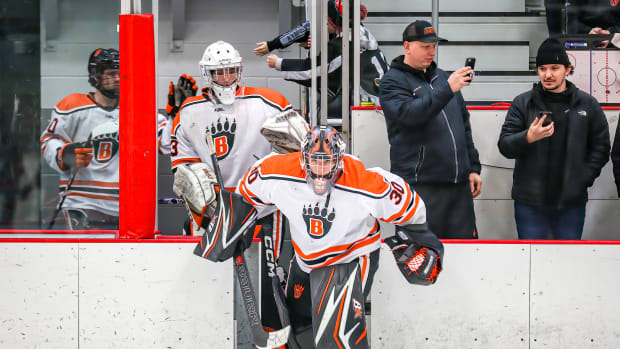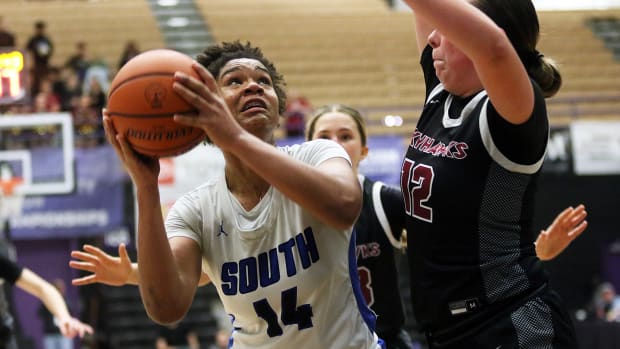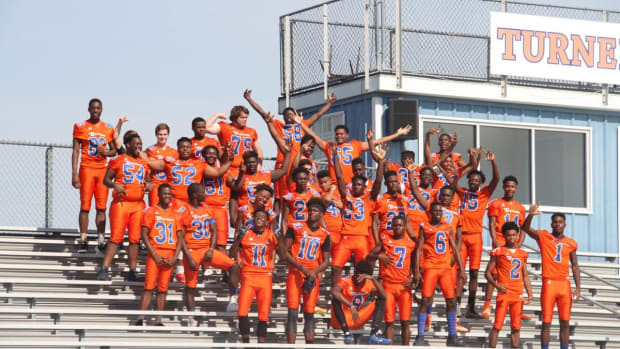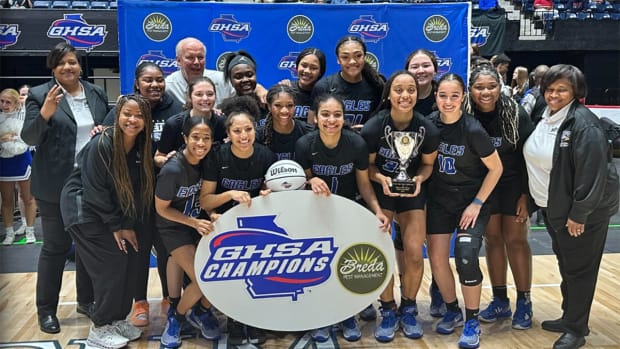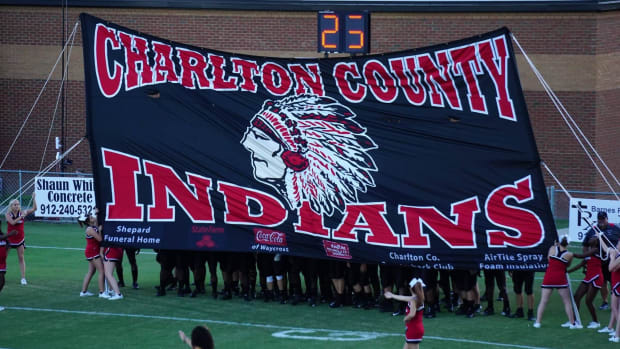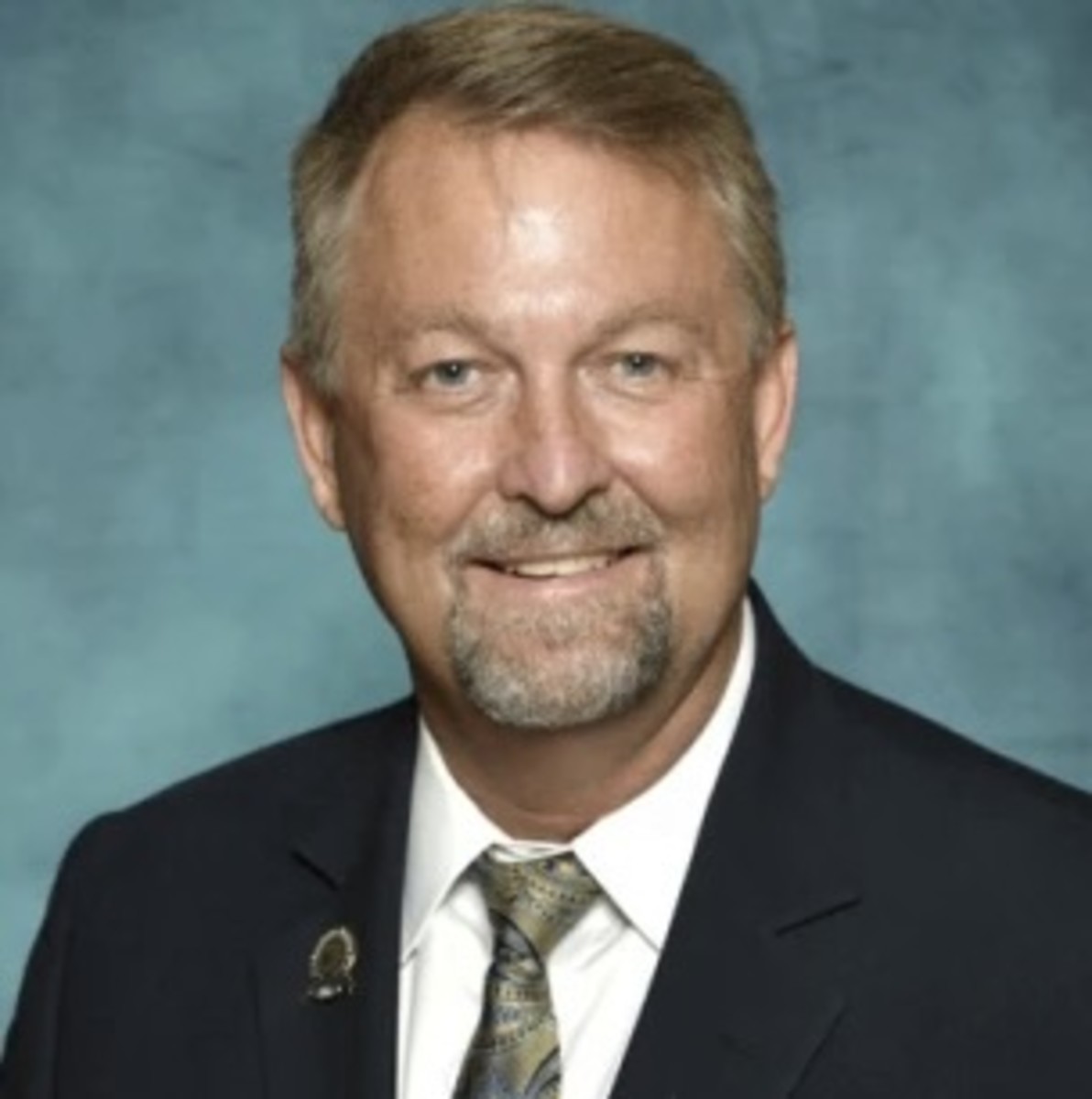
SBLive California Question and Answer: Mike West starts post as 10th Southern Section commissioner
Mike West has always been a leader.
He was captain of his high school and junior college cross-country teams, athletic director at Chino Hills High School and principal for the last eight years at King High School in Riverside.
In April, he was voted in as one California's biggest leaders — the commissioner — of the California Interscholastic Federation's largest section, the Southern Section. He replaced wildly popular Rob Wigod, who will retire on Aug. 1 after 12 years.
Not only was West voted in but he was done so unanimously, no small feat, considering the section covers 562 private and public high schools over densely populated Orange, Los Angeles, Riverside, San Bernardino, Ventura and Santa Barbara counties.
The 55-year-old is the section's 10th commissioner since the organization formed in 1913.

Former ML King-Riverside Principal Mike West is the Southern Section's 10th commissioner since 1913. Photo: Courtesy of Southern Section.
Known by his peers for being calm, laid back and considerate — "He thinks of other people," Harvard-Westlake head of athletics Terry Barnum told Eric Sondheimer of the Los Angeles Times, West showed all those traits in not one, but two interviews with SBLive Sports shortly after his hire.
A recording of the first 25-minute interview didn't go through and could not be transcribed. Within 24 hours, a second request for an interview — answering basically the same questions — was granted without hesitation or transference of guilt.
"Don't worry about it," West wrote. "It happens."
West is happening at his new job. Wednesday was his first official day.
We asked him about Wigod's legacy, his own athletic trainer background, his best marks as a runner, his influences, TikTok influencers, referee shortages, transfer overload, boorish fan behavior and gleeful reaction to his unanimous welcome.
All of his answers were thoughtful, direct and similar, but not exact, as the first Q&A. We found West warm, easy to laugh and as Barnum said, "personable."
SBLive California Q&A: New Southern Section commissioner Mike West
Mitch Stephens: What was it like in the first week or two after you were named commissioner?
Mike West: Yes, it's been actually quite exciting. There've been a lot of positive comments from people in my area, people I haven’t spoken to in quite some time, and people that are in and around the Southern Section. There seems to be some excitement with me coming into the chair which makes me feel good but also puts pressure on to make sure I can live up to their expectations.
MS: Who was the first person you told that you got the job?
MW: I told my wife (Rhonda). Of course (laughter).
MS: How long have you been married?
MW: In June it (was) 29 years.
MS: Is she in education? And what was her reaction?
MW: She’s a teacher — a special education teacher. She was very excited. We’ve been talking about this for a long, long time. You know, I’ve been doing all my preparation for interviews and those types of things. So we’ve had a lot of conversations and she was really, really happy for me.
MS: You've talked about the man you're replacing — Rob Wigod — at length. Can you talk about his influence and the pressures of replacing such a revered commissioner?
MW: First off, he has been just really kind and really given me a belief that I can do the job. He kept saying I was the right person and that I’ll do a great job. So he’s really given me a lot of positive reinforcement.
MS: Even before you were voted in?
MW: Yes. Along the way, if I had some questions over the last few years about things, he was always very nice and sat down with me and answered those types of questions. We still have to meet up and really have the Southern Section Commissioner 101 talk. ... But I feel like he's going to to be there for me. It’s very comforting. He lives right in Long Beach. He’ll be a great, great resource for me.
MS: How long ago did you actually consider the job? Five or 10 years? Longer?
MW: It was actually four years ago there was a National Federation meeting in Indianapolis — their 100th anniversary. I was out there with Rob and a number of others from the Southern Section. We were in a little social event and we got to talking and he mentioned that he was considering retirement in a couple of years. So it just kind of got my head spinning and then I asked a few questions and then basically considered it four years.
MS: It's certainly a daunting task. The sheer size of the section — three times larger than another other of the sections — and the large region from Orange to Santa Barbara counties, requires massive coordination. You relish that challenge?
MW: The real challenge is going to be to try to go out and meet people in different areas and to build relationships and to build trust. The reason Rob was able to do so many things and why he’s so revered is that he built trust and respect — almost unanimously from across the section. That’s hard to do. But he’s a man that has a certain skill set that really allows him to do that. My life path has been through building relationships as well. But the challenge is going to be getting out to everybody and doing some face-to-face time, meeting people and building the trust across the section.
MS: Speaking of your life path as far as it relates to athletics, you grew up in Northern California, ran track and cross country at Lynbrook High School in San Jose? What were your best marks in the mile and half-mile?
MW: It was a 4 minute, 26-second mile and 1:58 in the half mile. Not elite times but not bad either.
MS: How did running and competing in high school shape your life, literally if not figurative?
MW: During my middle school days I was pretty fast. I had good times and I tried hard. I remember vividly in the summer between eighth and ninth grade. I was watching TV in the living room but I got a knock on the door from the cross country coach at Lynbrook High School. He asked if I wanted to participate in cross country. I thought, ‘dang I’m getting recruited, this is fun.”
As far as how it shaped me? Being a part of a cross-country team isn't necessarily the same as being a teammate on baseball or football, but you still need to hold your own, you’re still holding each other accountable. When you’re on team runs, you’re talking a lot, keeping focused on the pace you’re supposed to go.
I ended up being a team captain when I was both in high school and in junior college (West Valley College in Saratoga), not because I was wanting to do that, but because some people saw some leadership skills that I had. So that was neat, to be able to contribute with the team and coaches in that way.
MS: Did you have any athletic idols growing up?
MW: Not so much. My dream was to run in the Olympics and back then guys like Dwight Stone and Bruce Jenner were the big names. But I came to a point that I realized I wasn't necessarily of that caliber.
MS: So, in college, you turned to sports medicine, which became your early career as an athletic trainer. How did that shape you for where you are today?
MW: It really helped set my frame of reference when it comes to what you’d call a work ethic. Athletic trainers are many times the first one at the site and the last one to leave. I’ve kind of kept that mantra in my work life. I typically leave the house at 5:30 (a.m.) and I only have a six-minute commute to King and I'll be doing the same way when I go to the (Southern Section) office.
Also when dealing with medical emergencies, I've learned how to remain calm under pressure in that regard. If you see a nasty injury and the athlete is really uncomfortable, the worst thing you can do is say ‘calm down, calm down, relax!’ You yourself have to remain calm to allow the other individual to remain calm. From that, I think it helps me when things get a little stirred up you can keep a cool head.
MS: Going from a cool head to hot topics, here are actually three words that have elicited a lot of reaction: Name, Image, Likeness. What are your thoughts on amateur prep athletes making moola?
MW: More power to these kids to be able to make as much money as they can. But where we run into problems is schools or entities associated with schools are providing those funds illegally. That's an issue that we got to make sure that doesn't happen. And are they using the school logos and their school team stuff to be able to promote it? Because that’s against the rules as well. But if a student-athlete is a TikTok influencer and they happen to have a lot of likes or followers, and they are somehow able to monetize that, more power to them as long as they're within the rules.
MS: Staying within transfer rules is certainly tricky and most topical. Tracking and enforcing those rules may be CIF's most difficult challenges. What are your thoughts on the scope of student athletes transferring year-to-year?
MW: Statewide we are in the neighborhood of 14,000 transfers annually. So many of those can be legitimate — bonafide moves, often times where a family decides they want to change schools. It’s hard for me to necessarily judge that per se. But as long as the rules are followed when a transfer is done, that all the correct information is provided, then fine. But if it’s not a bonafide move and they just want to switch schools, then they have to face the sit-out period.
Where we run into problems is when families aren't as truthful as they need to be. That leads to instant ineligibility. That’s the issue that we really got to face. I know there’s people who have real issues with recruiting and kids are transferring because of those types of things. Ideally, we want to eliminate that. I can’t say of those 14,000 what percentage are surely nefarious as opposed to just, family decisions if you will.
MS: Is there a way to curb the seemingly rampant problem of student athletes transferring for athletic reasons only?
MW: We have one of the larger offices as far as the number of people compared to other sections, in the volume of transfers and the capability of us truly investigating them is really a challenge. I’m sure the office gets plenty of calls with people saying ‘I heard this happened.’ OK, that’s great. But provide us with some evidence to what’s happening. Something that actually can be investigated. And then we’ll spend the time to make sure (it's legitimate). You can’t just go on innuendo and suspicion and hearsay.
MS: Fan behavior is a little more transparent. We've seen the nightmares caught on camera. Do you think this boorish behavior is more prevalent or that more people have cameras to catch it?
MW: I think the metric you're looking at is the number of officials who have stopped officiating because of the treatment they're receiving. That wasn't necessarily the case 10 or 15 or 20 years ago. But in recent years, one of the big reasons why we have fewer officials is because of the lack of respect, if you will, so to me that’s the measure that tells me yes, we're seeing more of it than then we used to.
MS: What effect have you seen with a shortage of referees and how big a concern is it moving moving forward in the Southern Section specifically?
MW: First off, this is a nationwide problem for sure but we see it here as well — in all sports we're seeing fewer officials. I’ll use football as an example because there was a time and place where all football games were Friday night. Now that’s just not feasible because there's just not enough officials to be able to manage all the games. So now there has to be Thursday and Saturday games. I know our league that we're in had to do two Thursday games a year to make sure we have enough coverage.
MS: The pandemic really seemed to bring to light the importance of high school sports as it relates to mental health. What were your observations with 2022-23 being largely uninterrupted by COVID-19 type issues?
MW: Actually, following or even during the pandemic, one of the things that remained somewhat normal was athletics. They came back sooner than anything else. I think a lot of athletes were able to participate in and get some sense of normalcy that many other students may not have had. So I believe that the athletes coming out of the pandemic were better adjusted than the non-athletes, mental health wise.
